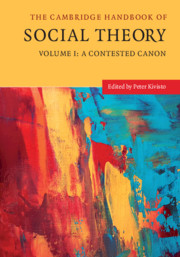Book contents
- The Cambridge Handbook of Social Theory
- The Cambridge Handbook of Social Theory
- Copyright page
- Contents
- Figures
- Tables
- Contributors
- Preface
- 1 The Emergence of Social Theory
- 2 “What Is a Classic?”
- 3 Karl Marx
- 4 The Marxist Legacy
- 5 Émile Durkheim: Theorist of Solidarity
- 6 What’s in a Name?
- 7 Max Weber
- 8 Weberian Social Theory
- 9 Georg Simmel and the Metropolitization of Social Life
- 10 Pounding on Parsons: How Criticism Undermined the Reputation of Sociology’s Incurable Theorist
- 11 Symbolic Interactionism
- 12 Erving Goffman and Dramaturgical Sociology
- 13 Structuralism
- 14 Norbert Elias, Civilising Processes, and Figurational (or Process) Sociology
- 15 Phenomenology and Social Theory
- 16 Pierre Bourdieu: An Intellectual Legacy
- 17 Developing Ethnomethodology: Garfinkel on the Constitutive Interactional Practices in Social Systems of Interaction
- 18 Jürgen Habermas
- 19 Anthony Giddens, Structuration Theory, and Radical Politics
- Index
- References
14 - Norbert Elias, Civilising Processes, and Figurational (or Process) Sociology
Published online by Cambridge University Press: 03 December 2020
- The Cambridge Handbook of Social Theory
- The Cambridge Handbook of Social Theory
- Copyright page
- Contents
- Figures
- Tables
- Contributors
- Preface
- 1 The Emergence of Social Theory
- 2 “What Is a Classic?”
- 3 Karl Marx
- 4 The Marxist Legacy
- 5 Émile Durkheim: Theorist of Solidarity
- 6 What’s in a Name?
- 7 Max Weber
- 8 Weberian Social Theory
- 9 Georg Simmel and the Metropolitization of Social Life
- 10 Pounding on Parsons: How Criticism Undermined the Reputation of Sociology’s Incurable Theorist
- 11 Symbolic Interactionism
- 12 Erving Goffman and Dramaturgical Sociology
- 13 Structuralism
- 14 Norbert Elias, Civilising Processes, and Figurational (or Process) Sociology
- 15 Phenomenology and Social Theory
- 16 Pierre Bourdieu: An Intellectual Legacy
- 17 Developing Ethnomethodology: Garfinkel on the Constitutive Interactional Practices in Social Systems of Interaction
- 18 Jürgen Habermas
- 19 Anthony Giddens, Structuration Theory, and Radical Politics
- Index
- References
Summary
Norbert Elias (1897–1990) is best known for his theory of civilizing processes. It was first advanced in 1939, but that was only an early stage in the development of a more comprehensive perspective of wide relevance for the social sciences. This chapter explains how in moving from philosophy to sociology, Elias rejected many of the dualisms common to conventional sociology and developed a “figurational” or “process” sociology that is always simultaneously theoretical and empirical. The theory of civilizing processes is then outlined, along with some of the criticisms leveled at it. Extensions of the theory include debates about decivilizing processes and informalization, as well as foundational studies in the sociology of sport. The chapter concludes with a summary of Elias’s processual theory of knowledge and the sciences and the general characteristics of the figurational research tradition.
Dr. Barbara Górnicka is an Assistant Professor of Sociology at University College Dublin, a Fellow of the Norbert Elias Foundation, and joint editor of the journal Human Figurations: Long-Term Perspectives on the Human Condition. Her publications include Nakedness, Shame, and Embarrassment: A Long-Term Sociological Perspective (Springer, 2016).
Professor Emeritus Stephen Mennell, University College Dublin, was General Editor of the 18-volume Collected Works of Norbert Elias in English (2006–2014). He holds doctorates from Amsterdam and Cambridge. His books include All Manners of Food: Eating and Taste in England and France (1985), Norbert Elias, Civilization, and the Human Self-Image (1989; later retitled Norbert Elias: An Introduction), and The American Civilizing Process (2007).
- Type
- Chapter
- Information
- The Cambridge Handbook of Social Theory , pp. 272 - 291Publisher: Cambridge University PressPrint publication year: 2020

